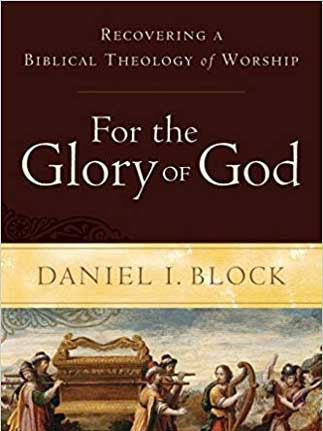
For the Glory of God: Recovering a Biblical Theology of Worship
Daniel Block
Baker Academic, 2014; 407 pages
![]()
Daniel Block is an Old Testament professor at Wheaton College. For the Glory of God represents the distillation of decades of his study and instruction regarding a biblical theology of worship. Block’s work is an excellent complement to Peterson’s Engaging with God, so it’s helpful to compare and contrast the two. While Peterson’s book moves through the Scriptures from Genesis to Revelation in one flow, Block lays out his book by topic, each chapter moving chronologically through the Scriptures to define and explain it:
- Toward a Holistic, Biblical Understanding of Worship
- The Object of Worship
- The Subject of Worship
- Daily Life as Worship
- Family Life and Work as Worship
- The Ordinances as Worship
- Hearing and Proclaiming the Scriptures in Worship
- Prayer as Worship
- Music as Worship
- Sacrifice and Offerings as Worship
- The Drama of Worship
- The Design and Theology of Sacred Space
- Leaders in Worship
Block affirms the work of Peterson and others on the subject of worship, but he contends that they are significantly imbalanced. He asserts (perhaps justifiably) that, in its formulation of practices regarding corporate worship, the modern church has largely disregarded the Old Testament (which Block insists on calling the “First Testament”). Within the first several pages, Block shows himself to identify with continuity in its strongest and most consistent forms, and he characterizes discontinuity as “driving a wedge between the Testaments” (Block, 5). He writes, “Those who will not take seriously the authority and transformative power of the Pentateuch and the rest of the First Testament have no right to appeal… to the book of Psalms in worship” (6). Taken at face value, such a statement is incontestable, but its veracity depends very much on what we mean by “taking the First Testament seriously,” In fact, Block maintains throughout the book that “unless the New Testament expressly declares First Testament notions obsolete, they continue” (7). Throughout the book it seems that Block has countered an imbalance with an imbalance of his own. While claiming that the New Testament has little to say regarding corporate worship, he focuses mostly on worship practices in Old Testament Israel. He carries many Old Testament elements into modern practice, most notably sabbatarianism.
But despite these obvious predilections, Block’s book is an outstanding resource. He helpfully places expressions of worship into three categories (p. 8):
- dispositional expressions (worship as attitude)
- physical expressions (worship as gesture)
- liturgical expressions (worship as ritual)
I found such a categorization incredibly thought-provoking. This first chapter alone is worth the price of admission, especially the chart on page 26. In an effort to help define such a rich term as “worship,” Block provides an outstanding birds-eye view of all that worship entails. Within the first 25 pages, I had already been forced to rethink several distinctions between worship in the Old and New Testament that I hadn’t previously considered.
I found myself interacting with the book throughout, highlighting and taking notes. Every chapter challenged my thinking on various dimensions of worship. Obviously, I was reading it with an eye towards the chapter on music, and Block’s insights there were very helpful. I did get the impression as I read that he had a distinct opinion of what “contemporary worship” was, but I felt as though his broad characterizations were somewhat inaccurate, though not expressly uncharitable. A book written even 15 years earlier would have more just cause to lament the absence of certain biblical practices in corporate worship music, but thankfully there has been growth in this area among doctrinally Reformed congregations, both in understanding and practice. As an elder statesman in his field, Block is entitled to his pessimism, but I’m more hopeful.
I received this book as a gift last Christmas, with strong commendation, and I’m sorry to say it sat on my shelf for nine months. Had I known how edifying it was, I would have begun reading it immediately. Block’s book is a strong complement to Peterson, perhaps even a replacement if forced to choose.
Those who lead the Lord’s people in corporate praise should rejoice at the recent wealth of wise counsel available to us: Block, Peterson, Carson, and many others.
